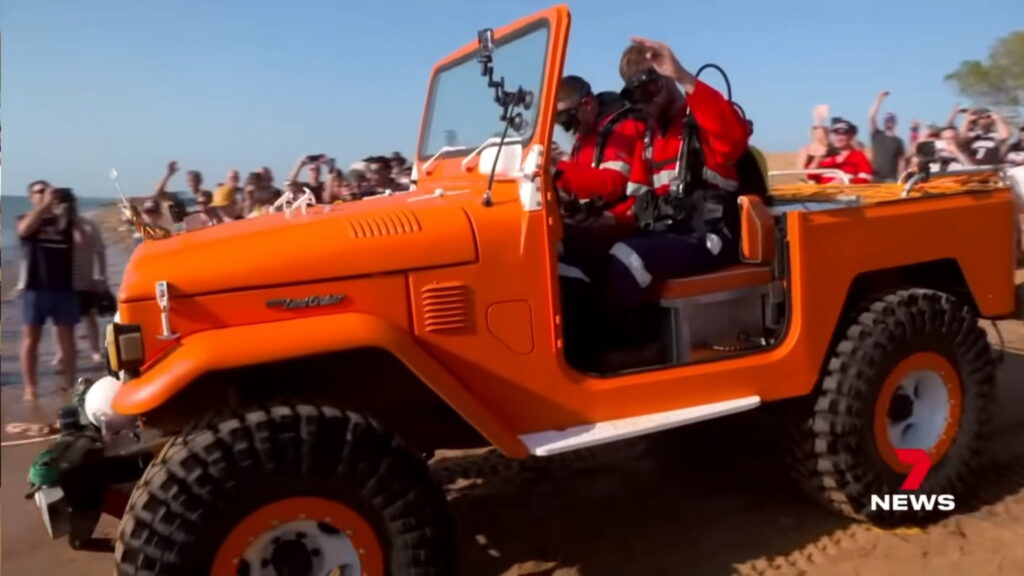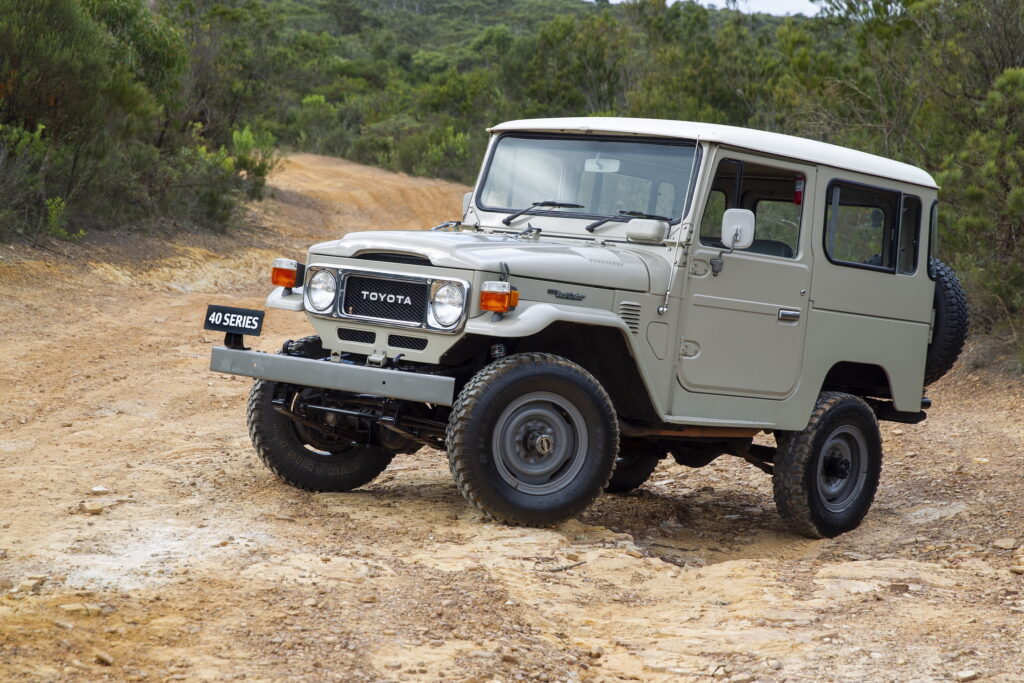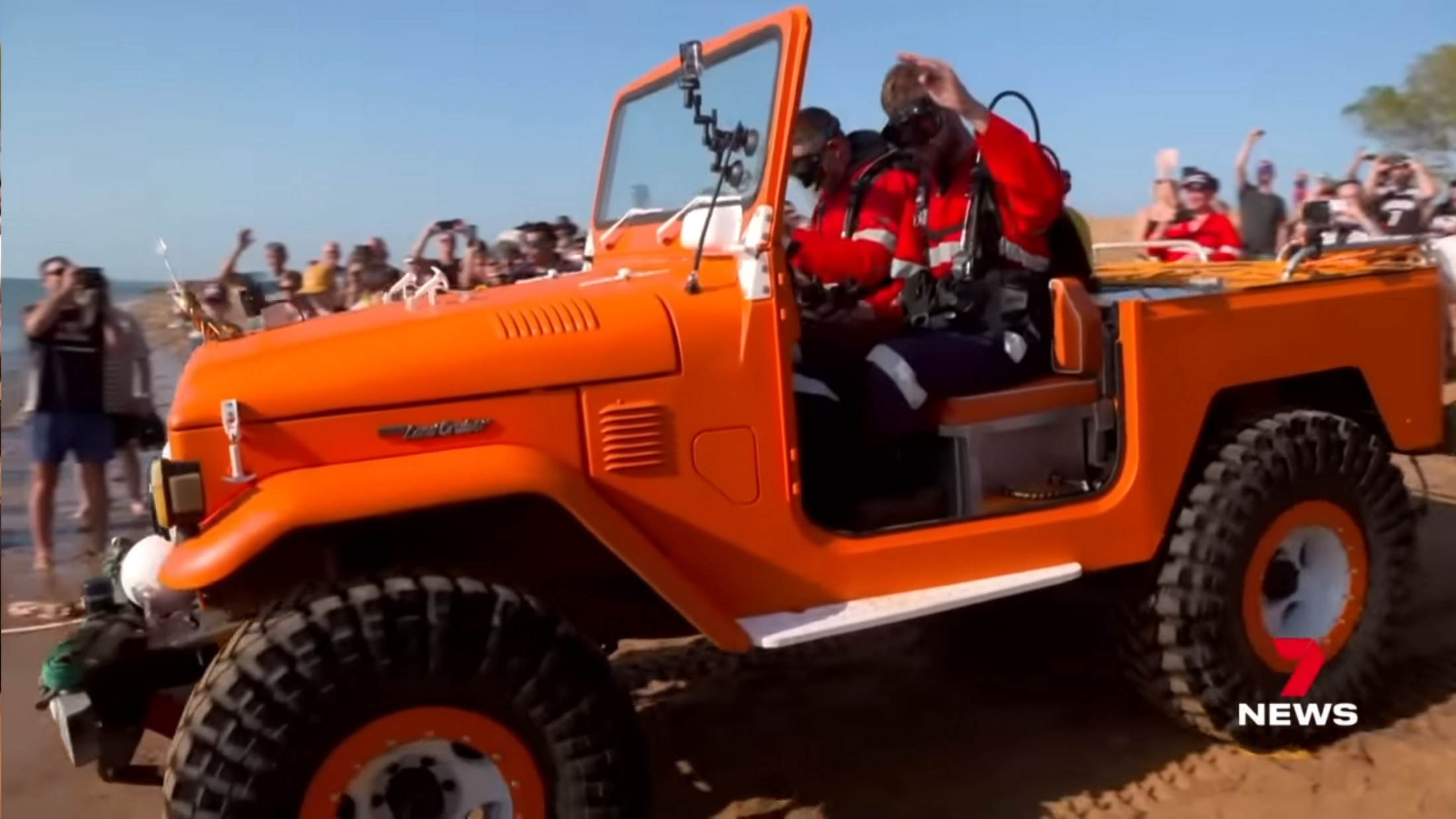A 1978 Toyota Land Cruiser dubbed the Mudcrab has driven 4.3 miles across Darwin Harbor in Australia, breaking distance and depth records for underwater driving, the team behind the feat claims
July 31, 2023 at 20:21

A team of Australians driving an electromodded 40 Series Toyota Land Cruiser says it has set the world record for the longest and the deepest underwater drive. The team drove 4.3 miles (7 km) across the Darwin Harbor, reaching depths of up to 98 feet (30 m).
The team, made up of a number of mechanical engineers, divers, and more, was inspired by a similar stunt, which was attempted by Darwinians in the early ’80s. Equipped with a 197-foot (60 meter) snorkel, the team tried to cross the harbor in a Land Cruiser, but stalled 1.8 miles in (3 km) and couldn’t get it started again.
To help make the journey easier, the team decided to simply get rid of its (non-roadworthy) 1978 Land Cruiser’s powertrain and replace it with an electric motor. Cosmos Magazine reports that the team felt confident it could do this because a number of them had worked on solar car projects at university. Meanwhile, they decided to go for the classic Land Cruiser because it would be easier to tear down.
advertisement scroll to continue
“I would not be interested in going about this in a more modern Land Cruiser,” said Glen Summers, a team member. “It [the 40 series ‘cruiser] is perfect for this. It doesn’t have to be registered and we don’t need any safety stuff, because we are driving really slowly … 1 to 3 kilometers an hour [0.6 to 1.8 mph].”
Read: Tesla Model S Plaid Daring Underwater Drive Is A Success, But Cost A Small Fortune
While that part of transformation was easy, making a solar car doesn’t prepare you for the pressure (and quite the same risk of electrocution) as an underwater drive. Taking inspiration from the world of underwater ROVs (remotely operated vehicles), the team encased the motor, controller, and batteries in silicon oil.
“We had a program of pressure testing – the very first hardware work we did on the project was to build a pressure chamber and test different battery cells; we also tested capacitors that were in the motor control,” said Summers. “Electrical hardware companies don’t really come out with the specs saying components are deep-water, high-pressure rated. You have to find out (for yourself).”
Meanwhile, they filled the tires with water to ensure they could handle the pressure, and help it stick to the bottom of the harbor. Although they were confident the powertrain could handle the pressure, they were only able to test the full car once in salt water before making their Darwin Harbor attempt.
But on Saturday, July 29, at around 9:00 a.m. local time, the team took off, expecting to reach the other side of the harbor by around 4:00 p.m. Unfortunately, although the Land Cruiser handled the water well, it got bogged down in the loose mud and silt of the harbor floor, slowing it down.
Every time this happened, the team had to attach balloons to it to help lift it out of the mud, reports ABC News. In addition, getting over a gas pipeline wound up taking the team longer than expected, delaying it further. Slowing its progress even more was the frequent need for driver swaps.

The driving team was made up of 30 commercial divers from across Australia because the pressure meant that they could only spend 15 minutes behind the wheel at a time. Moreover, there was the risk of coming in contact with a curious shark or salt water crocodile.
Fortunately, despite taking a long time, the team faced no catastrophic failures. Shortly before 9:00 p.m., 12 hours after taking off, the Land Cruiser, affectionately named “Mudcrab”, emerged from the deeps on the other side of the harbor and drove onto a beach of waiting spectators who helped celebrate the achievement.
The team hasn’t found a shortcut around the harbor (non-water-prepped Land Cruisers can still be ferried across it in just 15 minutes), but it remains an impressive feat of engineering and a fascinating record.
